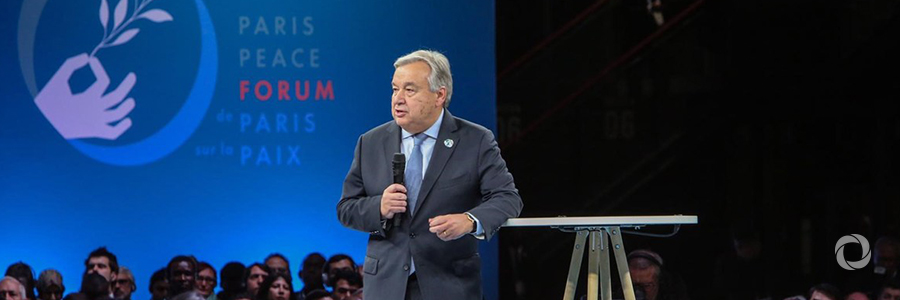From conflict and economic downturn to disease and climate change, global problems require “more than ever” a strengthening of international cooperation, United Nations Secretary-General António Guterres told world leaders at the Paris Peace Forum on November 11, commemorating 100 years since the end of the First World War.
“Over the past 100 years, the desire to settle conflicts peacefully on the basis of common rules has been converted into a universal system of institutions in the political, economic, social and environmental spheres,” said the UN chief.
“The horror of those great global conflicts cannot be forgotten… But horror must never prevail over hope,” he stated in his opening remarks for the Forum. “It was that same hope that gave rise to the development of multilateralism in the twentieth century,” referring to the creation of the League of Nations in 1919, and the United Nations following the Second World War in 1945.
This Paris Peace Forum, the first of its kind, is an initiative of the French Government led by President Emmanuel Macron. Held from 11 November to 13 November in the French capital, and labeled “a global forum for governance projects,” it gathers dozens of world leaders and representatives of international organisations, for a series of roundtables to discuss and reaffirm common commitment to tackle the great challenges of the world today.
Explaining that international cooperation – or “multilateralism” – has become a “necessity”, he stated that nations working together has “yielded undeniable results,” including a reduction in child mortality and extreme poverty over the last few decades; major battles won against public health threats such as smallpox, polio, and AIDS; and several successful conflict prevention and peacebuilding efforts.
“More than a million men and women from 125 countries have served in peacekeeping missions over the last 70 years to prevent the spread of crises, protect civilians and support political processes,” Mr. Guterres noted, adding that such deployments are “cost-effective”.
Citing figures from the US Government Accountability Office, he said that a national peacekeeping operation in the Central African Republic, for example, would have cost the United States ten times more than the UN’s mission, MINUSCA.
“The multilateral framework has also shown itself to be indispensable in resolving nuclear proliferation crises,” the UN chief added, referring to the Security Council’s unity in dealing with the Iranian and North Korean situations, which enabled negotiated solutions both in 2015 and in 2018.
The Secretary-General ended his statement by calling on Member States to engage in the advancement of key upcoming processes, including: the imminent COP 24 and next year’s Climate Change Summit; the December Marrakech meeting to realize the Global Compact for Refugees and Migrants agreed upon earlier this year; and the UNESCO Internet Governance Forum starting on November 12.
“The multilateralism that is now part of our daily life is at risk of disintegrating just when it is most needed,” he concluded. “Its legacy has been invaluable: an impulse by which devastation gave way to membership of a shared humanity”.
Among the participants of the Forum was the President of the UN General Assembly, María Fernanda Espinosa, who in one of the roundtables presented her vision for the UN’s most democratic body, including the D.A.R.E. programme, which she presented when she took office in September.
Original source: UN News
Published on 11 November 2018

